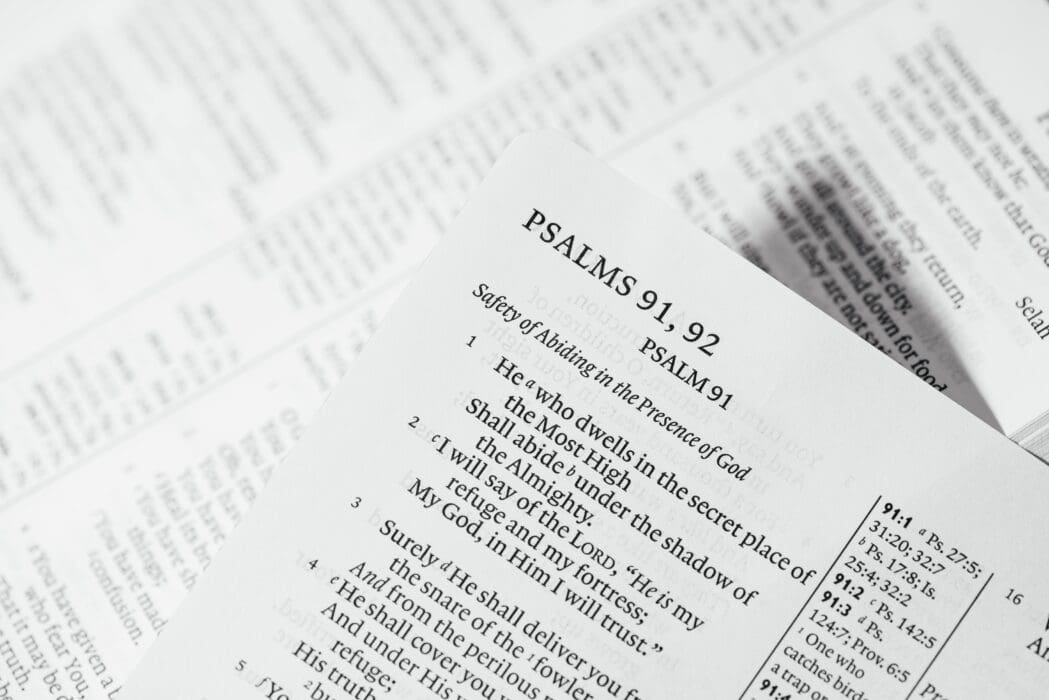The Psalms are a unique treasure of Scripture that connect a believer’s head and heart in a rich and vivid way. While most of Scripture delivers words from God to man, the Psalms provide man with Spirit-inspired words to pray and sing to God.
The format and diversity of the Psalms allows them to be used in a number of powerful ways individually and corporately – almost like a Swiss Army knife for our spiritual lives.
Eight Ways to Use the Psalms
1. Use the Psalms to cultivate a godly prayer life.
Have you ever not known what to pray? The psalms give believers the right words to pray when no words come to mind.
The Psalms teach the importance of being honest with God and that it’s okay to ask, “Why?” and “How long, O Lord?” We learn the necessity of submitting to Him in difficult times and the joy we have in approaching Him when we contemplate His greatness. Following the Psalter’s prayer patterns will enrich our prayers, making their substance fuller and more God-centered.
2. Use the Psalms to cultivate a life of worship.
How did Moses respond to God’s deliverance from slavery in Egypt? He sang a song (Exodus 15). How did David respond to the Lord’s deliverance from his enemies and Saul? He wrote a hymn of praise (2 Samuel 22; cf. Psalm 18). How did Asaph cure his envy of the wicked? He worshipped God and remembered his enemies’ fate (he recorded his story in Psalm 73).
Singing the psalms allows us to proclaim God’s words and let them dwell richly within us (Colossians 3:16). In doing so, we will be shaping our lives according to God’s Word and making worship a more natural part of our lives. The default setting of our hearts will be more focused on praise than on things like worry, our lives, and ourselves.
How lovely is your dwelling place, O Lord of hosts! My soul longs, yes, faints for the courts of the Lord; my heart and flesh sing for joy to the living God. (Psalm 84:1-2)
3. Use the Psalms to cultivate a culture of worship at your church.
The book of Psalms is a hymnal filled with songs for God’s people. Many of the psalms are intended for corporate worship, with some being directed to the Choirmaster and prescribing specific instruments for accompaniment (for example, Psalms 51-62).
Reading or singing the psalms corporately will shape individual hearts and minds in the congregation and help your church pursue a culture of worship.
Use them at the start of a service as a call to worship, for responsive readings, or as a response to a sermon. Your congregation will love how the rich imagery of Scripture speaks to their daily life and experience – and it will make their hearts sing!
4. Use the Psalms to cultivate a deep hunger for God.
The Psalms are a mirror to our souls that reveal our deepest longings. Their words shape our hearts by connecting with the Psalmists in a deep and emotional way:
One thing I have asked of the Lord, that will I seek after: that I may dwell in the house of the Lord all the days of my life, to gaze upon the beauty of the Lord and to inquire in his temple. (Psalm 27:4)
As a deer pants for flowing streams, so pants my soul for you, O God. (Psalm 42:1)
O God, you are my God; earnestly I seek you; my soul thirsts for you; my flesh faints for you, as in a dry and weary land where there is no water. (Psalm 63:1)
As you read the psalms and make them your prayer, God will work in you and change your desires to be more like His. You will be delighting in the Lord and will receive the desires of your heart (Psalm 37:4).
The most valuable thing the Psalms do for me is to express the same delight in God which made David dance. (C.S. Lewis)
5. Use the Psalms to cultivate a godly emotional life.
All Christians face emotional ups and downs. That goes for even the most even-keeled saints because even our Lord Himself went through emotional triumph and turmoil. The Psalms provide a faithful road map to follow in the world of emotions – triumph, turmoil, and everything in between. C. John Collins put it this way: “The psalms do not simply express emotions: when sung in faith, they actually shape the emotions of the godly.”
- How do we respond to deep sadness? Look to Psalm 43, which says, “Why are you cast down, O my soul, and why are you in turmoil within me? Hope in God; for I shall again praise him, my salvation and my God.”
- How do we respond when the wicked prosper? Look to Psalm 37:7, which says, “Be still before the Lord and wait patiently for him; fret not yourself over the one who prospers in his way, over the man who carries out evil devices!”
- How do we thank the Lord for such a great salvation? “Let them thank the Lord for his steadfast love, for his wondrous works to the children of man! And let them offer sacrifices of thanksgiving, and tell of his deeds in songs of joy!” (Psalm 107:21-22).
Using the Psalms for a biblical outlook on emotions will tune the strings of your heart to God’s perfect pitch.
6. Use the Psalms to cultivate a thankful heart.
God desires us to be thankful – in fact, thankfulness is His will for us (1 Thessalonians 5:18). Cultivating a thankful heart is especially important in a culture (even a church culture) that focuses on the gifts God gives instead of being thankful for what He already has given us in Christ. Thanking God puts us in our proper place as humble creatures dependent on an abundantly gracious Creator.
The Psalms of Thanksgiving celebrate God’s works and goodness to us. Like the Psalmists, we can remember God’s goodness across all of history (Psalm 105) and also His goodness to us personally (Psalm 40).
When God has turned your mourning into dancing (Psalm 30:11), given you a firm place to stand (Psalm 40:1-2), and been your rock and salvation (Psalm 62:1), how could you keep your heart from giving thanks?
7. Use the Psalms to cultivate a deeper understanding of the Christian life.
The Psalms will shatter to pieces any ideas that being a Christian is a walk in the park. The Psalms show us the wide spectrum of the Christian life, from mountain top experiences to walking in the valley of the shadow of death.
We can hide from our enemies in a cave with David (Psalm 57), cry out to God because of injustice with Asaph (Psalm 82), contemplate the shortness of life and greatness of God with Moses (Psalm 90), and enter into the abandonment of our Savior (Psalm 22). The Psalms will teach us how to live wisely in difficult times.
As you read the Psalms with your Christian experience in mind, God will humble you, refine your expectations about life, and show you His faithfulness and steadfast love.
8. Use the Psalms to behold the Savior.
Jesus used the Psalms in many of the ways described above. Christ was intimately acquainted with the Psalms and would have both prayed them and sung them. Jesus was fully God and fully man – this means that He knows the experience of the psalmists and is Himself the God described as a King we can take refuge in.
We see in Jesus’ own words to His disciples that the Psalms find their ultimate fulfillment in Him: “Everything written about me in the Law of Moses and the Prophets and the Psalms must be fulfilled” (Luke 24:44). As you read through the Psalms, keep a close eye on New Testament cross-references that quote the Psalms in reference to Christ. Also keep an eye on references to gospel themes or characteristics of Christ.
Here are a few highlights of Christ in the Psalms:
- Psalm 102:25-29 describes Christ as the eternal Creator (cf. Hebrews 1:10-12).
- Psalm 16 describes the resurrection and future glory of Christ (Acts 2:25–28).
- Psalm 110 describes the dominion of Christ and His future judgment (Hebrews 7:11–28).
Seeing Jesus Christ in the Psalms is more than playing “Where’s Waldo” – looking for Christ and then quickly moving on to the next thing. God wants us to encounter the living Christ and find life in His name. He wants to transform our hearts and minds to love Him and glorify Him like He did with the psalmists.
Watch this clip on the power of praying Psalm 37 from the free course Pray the Bible:





